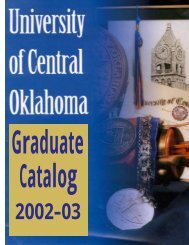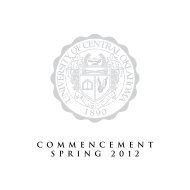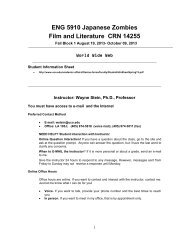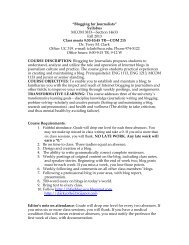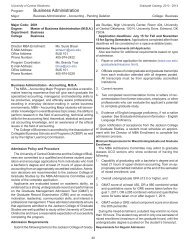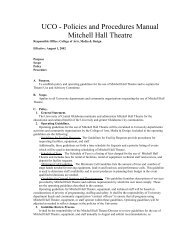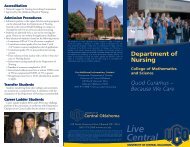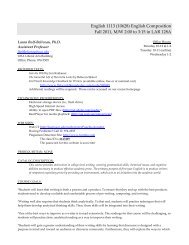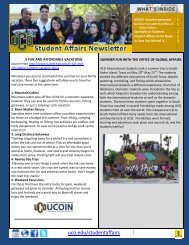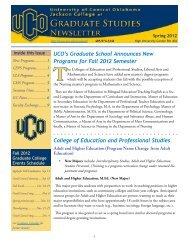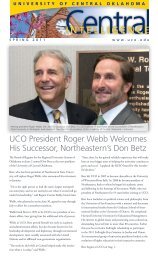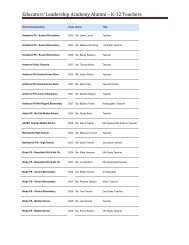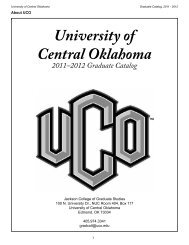Graduate Catalog - University of Central Oklahoma
Graduate Catalog - University of Central Oklahoma
Graduate Catalog - University of Central Oklahoma
You also want an ePaper? Increase the reach of your titles
YUMPU automatically turns print PDFs into web optimized ePapers that Google loves.
<strong>University</strong> <strong>of</strong> <strong>Central</strong> <strong>Oklahoma</strong><br />
<strong>Graduate</strong> <strong>Catalog</strong>, 2012 - 2013<br />
<strong>Graduate</strong> Course Descriptions<br />
ENG 5950 - Internship In English<br />
Credit will vary from 1 to 8 hours. Subject matter will vary within the<br />
department’s field <strong>of</strong> study. Supervised practical experience gained<br />
in a pr<strong>of</strong>essional field by an advanced or graduate student.<br />
ENG 5960 - Institute In English<br />
Credit will vary from 1 to 8 hours. Subject matter will vary within the<br />
department’s field <strong>of</strong> study.<br />
ENG 5970 - Study Tour<br />
Credit will vary. Subject matter will vary within the department’s field<br />
<strong>of</strong> study.<br />
ENG 5990 - Thesis In English<br />
Credit will vary from 1 to 6 hours. Subject matter will vary within the<br />
department’s field <strong>of</strong> study.<br />
ENGINEERING (ENGR)<br />
Department <strong>of</strong> Engineering<br />
ENGR 5023 - Heat Transfer<br />
This course introduces basic thermal-energy transport processes,<br />
conduction, convection, radiation, and the mathematical analysis <strong>of</strong><br />
systems involving these processes in both steady and time-dependent<br />
cases. Prerequisite(s): MATH 3103, ENGR 3443, 3703 or concurrent<br />
enrollment in ENGR 3703.<br />
ENGR 5083 - Electromagnetic Fields II<br />
This course presents the application <strong>of</strong> Maxwell’s equations to timevarying<br />
electromagnetic fields, electromagnetic waves, radiation,<br />
diffraction, the electromagnetic theory <strong>of</strong> light, and antenna design.<br />
Prerequisite(s): ENGR 3183.<br />
ENGR 5103 - Finite Element Analysis<br />
This course will cover the advanced topics <strong>of</strong> finite element analysis<br />
(FEA) including FEA formula for tress, beam, 2D and 3D elasticity<br />
problems, general theory and applications <strong>of</strong> FEA. This course includes<br />
approximate solution methods, the RITZ method, interpolation, isoparametric<br />
finite elements, and displacement-based bending elements<br />
for solving complex engineering problems. The course incorporates<br />
the development <strong>of</strong> stand-alone finite element computer codes and<br />
the application <strong>of</strong> commercial finite element s<strong>of</strong>tware packages to<br />
analyze advanced solid mechanics problems. Prerequisite(s): ENGR<br />
2143, 3703 and PHY 3883.<br />
ENGR 5163 - Engineering Optics<br />
The principles <strong>of</strong> geometrical and physical optics are applied to the<br />
analysis and design <strong>of</strong> optical systems including uniaxial and biaxial<br />
crystals, Gaussian-beam propagation, optical resonators, lasers,<br />
q- switching and mode locking, line broadening and electro-optic<br />
modulations. Prerequisite(s): <strong>Graduate</strong> standing and permission <strong>of</strong><br />
instructor.<br />
ENGR 5303 - Control Systems<br />
This course focuses on linear, non-linear, and discrete automatic control<br />
systems; feedback control; system robustness and stability; and<br />
classical and modern control theories. Prerequisite(s): ENGR 3323.<br />
ENGR 5323 - Digital & Analog Communication<br />
This course addresses selected theoretical and practical aspects<br />
<strong>of</strong> digital and analog communications systems such as amplitude<br />
modulation, frequency modulation, phase modulation, pulse code<br />
modulation, PSK, ASK, probability <strong>of</strong> error, and mulitplexing. It also<br />
covers the sampling theory and analog to digital conversion. This<br />
course develops the engineering mathematics and techniques to<br />
describe the physical transmission <strong>of</strong> information over band-limited<br />
channels, taking into account channel characteristics and the presence<br />
<strong>of</strong> noise and distortion. Prerequisite(s): ENGR 3323.<br />
ENGR 5333 - Digital Signal Processing &Lab<br />
The course discusses the representation, analysis, and design <strong>of</strong><br />
digital signals and systems. Among the topics that will be covered<br />
are discrete signals and systems, signal sampling and reconstruction,<br />
z-transform, discrete Fourier transform, fast Fourier algorithms, also<br />
IIR and FIR filter structure and design. Prerequisite(s): ENGR3323.<br />
Concurrent enrollment in ENGR 5333L is required.<br />
ENGR 5333L - Digital Signal Processing Lab<br />
This course comprises the laboratory component <strong>of</strong> ENGR 5333.<br />
Labs are designed to facilitate and reinforce the understanding <strong>of</strong><br />
the concepts covered in the lecture course, and equip students with<br />
the skills associated with digital signal processing. Prerequisite(s):<br />
Concurrent enrollment in ENGR 5333 is required.<br />
ENGR 5343 - Biomechanics<br />
This course applies engineering principles to biological systems.<br />
Topics in this course include circulatory system, lymphatic system,<br />
nervous and sensory systems, respiratory system, urinary system,<br />
muscular system, skeletal system, digestive systema nd immune<br />
system. Prerequisite(s): ENGR 3203.<br />
ENGR 5443 - Fluid Dynamics<br />
The fundamental equations and solution methods <strong>of</strong> fluid dynamics<br />
are presented with particular attention to solving the Navier-Stokes<br />
equation. Topics covered will include mass conservation, momentum<br />
and energy equations for continua, potential flow, incompressible and<br />
compressible flows, viscous flow, similarity and dimensional analysis,<br />
boundary-layer theory, vorticity, and turbulent flow. Prerequisite(s):<br />
ENGR 3203, 3443, MATH 3103.<br />
ENGR 5533 - Thermal Systems Design<br />
This course develops the concepts and methodology <strong>of</strong> advanced<br />
system design, energy analysis, and optimization applied to thermalfluid<br />
systems. Topics include simulation and analysis to determine<br />
performance <strong>of</strong> existing systems; and design <strong>of</strong> thermal-fluid systems,<br />
including component selection, to meet specified requirements. A<br />
discussion <strong>of</strong> engineering economics relevant to design topics covered<br />
is included in this course. Prerequisite(s): ENGR 4123 or 5023.<br />
ENGR 5553 - Applied Problems<br />
The methods used to assess and solve applied problems commonly<br />
encountered in modern industry and technology are presented.<br />
Prerequisite(s): <strong>Graduate</strong> standing and permission <strong>of</strong> instructor.<br />
ENGR 5613 - Photonics<br />
The ray, wave, and photon-formulations <strong>of</strong> optics are developed<br />
and applied to engineering waveguides, fiber optics, and ultra-fast<br />
laser systems. Applications to nonlinear optics, laser holography,<br />
nanostructures, quantum statistics <strong>of</strong> photons, three- and four-wave<br />
mixing, near- field microscopy, advanced spectroscopy methods,<br />
and light- scattering are covered. Prerequisite(s): ENGR 5163; or<br />
graduate standing and permission <strong>of</strong> instructor.<br />
ENGR 5633 - Solid State Devices<br />
The physical principles <strong>of</strong> operation <strong>of</strong> the p-n junction, metal semiconductor<br />
contact, bipolar junction transistor, MOS capacitor, MOS<br />
and junction field-effect transistors, and related electro-optical devices<br />
are presented. First-order device models reflecting the underlying<br />
physical principles are developed. Prerequisite(s): PHY 3103 and<br />
ENGR 3183 or permission <strong>of</strong> instructor.<br />
219



